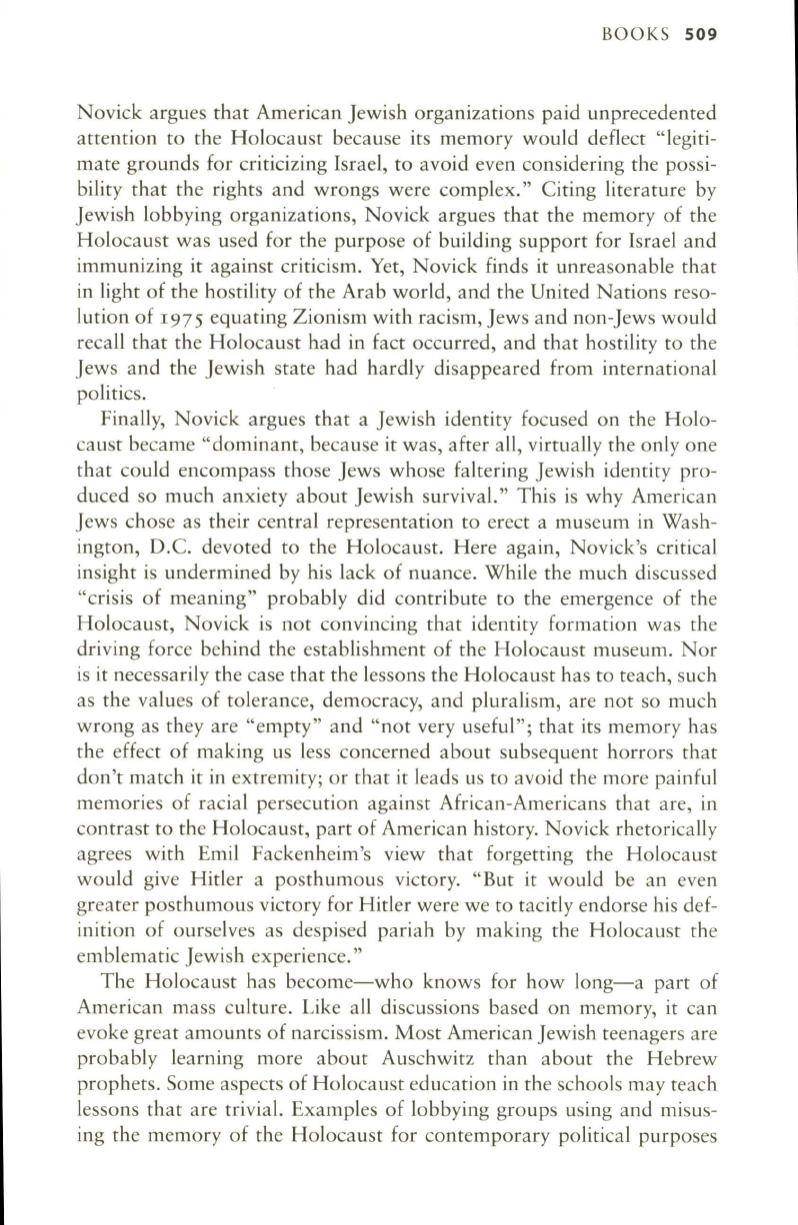
BOOKS
509
Novick argues that American Jewish organizations paid unprecedented
attention to the Holocaust because its memory would deflect "legiti–
mate grounds for criticizing Israel, to avoid even considering the possi–
bility that the rights and wrongs were complex." Citing literature by
Jewish lobbying organizations, Novick argues that the memory of the
Holocaust was used for the purpose of building support for Israel and
immunizing it against criticism. Yet, Novick finds it unreasonable that
in light of the hostility of the Arab world, and the United Nations reso–
lution of
1975
equating Zionism with racism, Jews and non-Jews would
recall that the Holocaust had in fact occurred, and that hostility to the
Jews and the Jewish state had hardly disappeared from international
politics.
Finally, Novick argues that a Jewish identity focused on the Holo–
caust became "dominant, because it was, after all, virtually the only one
that could encompass those Jews whose faltering Jewish identity pro–
duced so much anxiety about Jewish survival." This is why American
Jews chose as their central representation to erect a museum in Wash–
ington, D.C. devoted to the Holocaust. Here again, Novick's critical
insight is undermined by his lack of nuance. While the much discussed
"crisis of meaning" probably did contribute to the emergence of the
Holocaust, Novick is not convincing that identity formation was the
driving force behind the establishment of the Holocaust museum. Nor
is it necessarily the case that the lessons the Holocaust has to teach, such
as the values of tolerance, democracy, and pluralism, are not so much
wrong as they are "empty" and "not very useful"; that its memory has
the effect of making us less concerned about subsequent horrors that
don't match it in extremity; or that it leads us to avoid the more painful
memories of racial persecution against African-Americans that are, in
contrast to the Holocaust, part of American history. Novick rhetorically
agrees with Emil Fackenheim's view that forgetting the Holocaust
would give Hitler a posthumous victory. "But it would be an even
greater posthumous victory for Hitler were we to tacitly endorse his def–
inition of ourselves as despised pariah by making the Holocaust the
emblematic Jewish experience."
The Holocaust has become-who knows for how long-a part of
American mass culture. Like all discussions based on memory, it can
evoke great amounts of narcissism. Most American Jewish teenagers are
probably learning more about Auschwitz than about the Hebrew
prophets. Some aspects of Holocaust education in the schools may teach
lessons that are trivial. Examples of lobbying groups using and misus–
ing the memory of the Holocaust for contemporary political purposes


